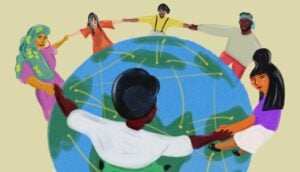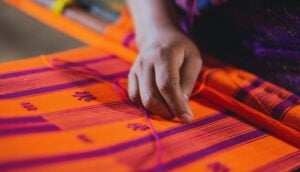In the coming days, the Intergovernmental Panel on Climate Change (IPCC), will publish its next milestone report; this one focusing on the mitigation of climate change, including an assessment of technologies to remove CO2 from the atmosphere. Their last report, published in February, focused on the impacts of climate change. Beyond the science and the jargon, there is one simple fact: this is about people.
According to the IPCC, more than 40% of the world’s population are “highly vulnerable” to climate change, with those “people and ecosystems least able to cope…being hardest hit”. We know that existing inequities due to factors including gender, ethnicity, geography and income, increase the severity of the risks people face and limit their access to the opportunities of the transition to a green economy. At the same time, climate change is one of the biggest threats to eliminating poverty across its dimensions.
We believe that all of us, including business, must put people at the heart of our understanding and action on climate change. It’s a year since Business Fights Poverty launched its programme on business and climate justice, with a framework for action, co-authored with the Corporate Responsibility Initiative at Harvard Kennedy School and Change by Degrees. Since then we have brought together 1,000s of people across our community to share insights, including at COP26 in Glasgow (you can find the videos and summaries here).
The next key milestone is the COP27 climate summit scheduled to take place in Sharm el-Sheikh, Egypt, from 7-18 November. We’ll be there, and in the run-up we’re launching a campaign to accelerate business action and advocacy on climate justice alongside civil society and government. This will include a string of convenings, from online discussions to virtual summits, as well as new learning resources and a special series with the Stanford Social Innovation Review distilling good practice. You can find out how to get involved here.
Most importantly, we are committed to giving voice to those who are on the front lines of climate impacts, such as Bismark Kpabitey and Rachel Banda, Fairtrade farmers in Ghana and Malawi, respectively, and Monique Ntumgia who is training and empowering women as solar tech entrepreneurs in West Africa. In our experience, it is people on the front line who are the real pioneers and leaders in adaptation and resilience.
Our aim is to crowdsource the expertise of this amazing community to co-create resources to help business practitioners and decision-makers be as effective and impactful as possible, including the next version of our climate justice framework. We are also actively developing a range of collaborations with our business supporters to identify and scale climate justice solutions. Business has a powerful role to play, through its core business, as well as its community investment and advocacy, in driving equity and building resilience of the most vulnerable people and communities.
The next opportunity to engage will be an online discussion on Thursday 7 April, 10 am ET / 3 pm BST. This will explore how to prevent the transition to net-zero from having adverse impacts on people’s human rights. It will also explore how to help companies’ human rights and environment colleagues overcome siloed ways of working and finding shared solutions to the challenges. Questions will include: What examples of emerging best practice exist and where are companies taking action? Which sectors are doing this well? What are the biggest challenges? What role can technology, including social technology, play to ensure that impacted communities have a greater say in the decisions being made? We’ll be joined by a panel of experts and practitioners, including from the Ethical Trading Initiative, Business and Human Rights Resource Centre and Change By Degrees.
I invite you to join us next Thursday to share your insights and connect with your peers. And I’d welcome your experience and expertise as we travel together on the road to COP27 and collectively help put people at the heart of climate action.










